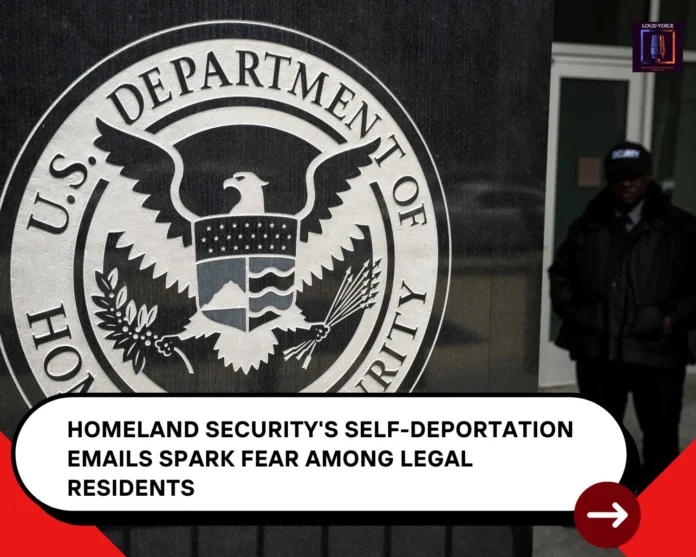Key Takeaways
- A U.S. immigration attorney received one of the alarming self-deportation emails from DHS, sparking widespread concern across legal and immigrant communities.
- Similar notices have reached visa holders, green card holders, and even U.S. citizens.
- The DHS claims errors may have stemmed from misused contact details submitted by undocumented immigrants.
- The emails coincide with Trump-era policies like the Alien Enemies Act and the termination of parole programs.
- The situation highlights growing unease around automated immigration enforcement practices and digital communication failures.
Homeland Security’s Self-Deportation Email Mistake: What Really Happened?
Imagine waking up to an email from the U.S. Department of Homeland Security (DHS) ordering you to leave the country within a week—despite being a U.S. citizen. That’s exactly what happened to Nicole Micheroni, an immigration lawyer and American-born citizen. Her story, now making waves across immigration circles and media platforms, is not just a simple case of mistaken identity. It opens up a much larger conversation about immigration enforcement, digital communication misfires, and a legal system caught in the crosshairs of policy and politics.
Let’s unpack the alarming chain of events and what they might mean for thousands of people currently living in the U.S.—legally or otherwise.
A U.S. Citizen Told to “Self-Deport”: How Did We Get Here?
Nicole Micheroni, a partner at a Massachusetts-based law firm, has spent her career advocating for immigrants. But on a quiet Friday, she found herself at the center of the very system she represents. The email she received from DHS stated in no uncertain terms:
“It’s time for you to leave the United States… Unless it expires sooner, your parole will terminate 7 days from the date of this notice.”
Except—here’s the twist—Micheroni isn’t on parole. She’s not an undocumented immigrant. She’s an American citizen.
Initially, she assumed the email must have been meant for a client or perhaps was a phishing scam. But the email came to her personal inbox, not her work one. “Afterwards, I was like, ‘Wow, I can’t believe they are just sending this out to those it just doesn’t apply to,’” she told Newsweek.
A Wave of Similar Emails Raises Red Flags
Micheroni’s experience isn’t isolated. Since the Supreme Court allowed the Trump administration to revive the Alien Enemies Act—a centuries-old wartime law—there has been a noticeable uptick in reports of similar emails reaching other residents, including green card holders and visa holders.
The language used in these emails is stern, unsettling, and very direct:
“Do not attempt to remain in the United States – the federal government will find you.”
That level of severity, combined with the fact that these messages are being received by people who aren’t even subject to deportation, has triggered waves of confusion and fear within immigrant communities.
Could This Be a System Glitch or Something More?
According to a DHS official, the emails are real but may have been sent to unintended recipients. How? Well, here’s where it gets messy. DHS explained that the Customs and Border Protection (CBP) used email addresses that undocumented immigrants submitted—sometimes those of legal residents or even citizens who assisted them.
If someone used an immigration attorney’s contact info during the application process, that person might be looped into DHS’s automated notification system. A major oversight, no doubt, and one that shows just how flawed and impersonal this digital enforcement process can be.
“Even if they admit error and take it back, this is the kind of thing that can send a lot of fear through communities.”
– Aaron Reichlin-Melnick (senior fellow at the American Immigration Council)

The Role of the CBP Home App in Self-Deportation
Adding another layer to this chaotic puzzle is the recently launched CBP Home App, which allows immigrants to self-report and voluntarily deport. Introduced in March, DHS pitched it as a “safe and resource-efficient” option. It’s also part of a broader attempt by the Trump administration to reframe immigration enforcement under the “America First” umbrella.
The app, however, blurs ethical and legal lines. Critics argue that encouraging people to self-deport via a mobile app, especially when communication errors are already happening, can cause irreversible damage to those who might actually be eligible to stay.
A DHS press release claimed, “The CBP Home app gives aliens the option to leave now and self-deport, so they may still have the opportunity to return legally in the future and live the American dream.”
The warning that followed was far less diplomatic: “If they don’t, we will find them, we will deport them, and they will never return.”
Alien Registration Requirement: The New Compliance Rule
As if that weren’t enough, DHS also rolled out the Alien Registration Requirement (ARR) on April 11. The rule mandates that undocumented immigrants must register with the government within 30 days—or face “severe penalties.”
While the government says this will help allocate resources toward more dangerous individuals, civil rights groups have raised alarms about the potential for misuse and abuse, particularly when combined with flawed data and communication channels.
Social Media Missteps Add to the Tension
ICE shared a contentious graphic on social media the same day ARR was revealed, announcing its goal to prevent “illegal ideas” from entering the country. The backlash was swift, and the post was quickly taken down.
Homeland Security officials later clarified that it was a typo—the graphic was supposed to say “intellectual property,” not “ideas.” Still, the damage was done. For many, it signaled a broader pattern of messaging and enforcement that feels more dystopian than procedural.
Termination of the CHNV Parole Program
The emails and app weren’t the only immigration developments last week. DHS also announced the termination of the Cuba, Haiti, Nicaragua, and Venezuela (CHNV) parole program. Initially introduced under the Biden administration for humanitarian purposes, the program had allowed around 532,000 people to live and work in the U.S.
As of April 24, 2025, those who benefited from CHNV will lose their legal status.
A DHS official defended the move, stating, “This is a return to common-sense policies, a return to public safety, and a return to America First.” But critics say that rolling back such humanitarian programs will only deepen the immigration crisis.
Conclusion: A Growing Crisis of Trust in U.S. Immigration Enforcement
What started as a mistaken email to an immigration attorney has peeled back the curtain on a much larger issue: a system that’s increasingly automated, impersonal, and prone to errors. The combination of revived Trump-era laws, tech-based enforcement, and a wave of confusing or incorrect communications has left many residents—documented and undocumented—nervous about their future in the United States.
While DHS continues to assure the public that they’re “monitoring communications,” it’s clear that something more than just monitoring is needed. Because when even U.S. citizens are being asked to leave their own country, it’s not just a clerical error—it’s a wake-up call.


